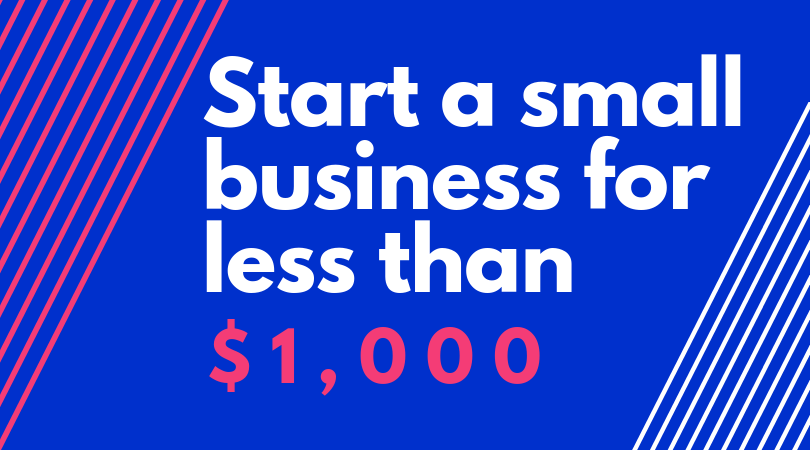How To Start A Small Business For Less Than $1000
When starting a small business in Canada it’s important to have some capital to invest. How much you need to start a small business really depends on a number of different factors and each business is different. To start a small business for less than $1000 is very possible. Along as you’re able to cover your basic startup costs!
Getting into business and wanting to be an entrepreneur is exciting but before you go down that path there are certain things you simply have to understand:
- In order to start a small business you will need to invest some money. In this case we will show you how to start a small business for less than $1,000.
- The amount of time you allocate to your business can play a major impact on the success of your small business. Be sure to have the time to invest.
- You will have to know a thing or two about what you’re getting into (The industry. We can guide you with the business aspect of it).
How to start a small business for less than $1000
Starting a small business isn’t a decision that one makes randomly. Instead, careful planning and thought should go into a business idea.
What is it that you want to do? Why do you want to do this? How will you do it? What will you need?
These are the typical startup questions you need to ask yourself prior to even deciding that this is the option for you.
While individuals have started a business with less than $1,000, not all businesses have the ability to succeed with such a limited investment.
The amount of initial capital you need when starting a small business depends on the business model, the industry, location..etc
For example: Starting an ecommerce store versus a barber shop.
The ecommerce store will costs you under a $1,000 most likely – you will need a ecommerce website (many can be had for free), a website logo, some inventory which you can drop ship (no cost to you) and some money in advertising. However a barber shop will cost much more right off the bat simply by adding a store front. Not to mention the costs of hiring staff, buying the equipment, paying the utilities..etc
So before you jump into it and say “I’m doing it with a $1,000”, slow it down.
Take some time to do the necessary research and figure it all out first.
Steps to start a small business for less than $1000
Starting out in business, everyone will have an opinion of what you should do and what not to do. Here are the 3 critical steps to ensuring that you’re able to startup with under $1,000 but also not have to worry about the funds.
Step #1: Think about your small business idea
Your business idea will guide you in determining the startup costs which you may need. By doing so you will have a better idea of what you will need in terms of the initial startup capital and will be able to make a smarter decision or perhaps switch your idea to something you can afford to invest in.
To start a small business for less than $1000 is not the ideal situation, it is manageable but does require a bit more work on your end.
Step #2: Create your business plan
Your business plan is very important. In fact, creating a business plan is often the first step many business owners take when starting up.
The reason for it is that it will help you determine the viability of your business before you have to invest any money into the business. In other words, a properly developed business plan will act as a guide to the success of your business and will be a true test on paper if the business will work or not. While not 100% accurate, at least you will understand the process and have certain expectations.
The scary part of needing a business plan is that they often cost between $1,500 to $5,000 to make professional. Now if you’re trying to start a small business for less than $1,000 you are out of luck if you wanted to have somebody else do it for you. Instead, using tools such as the Business Plan Builder Tool can really help you get a professional business plan done and give you access to experts who can assist. Extremely valuable for the money needed.
Step #3: Finding “more” funding
The $1,000 which you want to use to use towards starting a small business is great but if you really want to boost your chances of succeeding with your business, you will need to plan ahead.
Planning ahead means being able to obtain and secure more funding for your startup.
So how do you find more funding so that early on you can start a small business for less than $1000
- You can ask family and friends
- Use personal savings or personal credit cards
- Find a private investor or business partner
- Access government funding programs (grants, loans and tax breaks)
While finding more funding isn’t always necessary, your odds of succeeding when you have more capital available are much greater.
When you’re ready to start your small business, start at the top of the list. Be sure to have that $1,000 ready as it will go pretty quickly.
So look in your pockets, look underneath the couch, ask your family and friends…and when you have enough built up…put it all in a box and let’s get started.

The search for more funding:
Before you decide on the search for funding for your small business it is important to remember the following tips on getting your small business funded:
- Figure out how much money you have
- How much money will you need
- Understand how it will help if you are to get more
- Prepare your backup plan if you can’t get funded
Use the Funding Database offered here by CanadaStartups.org to get a head start on your funding search. Government funding can play a major role in your success, especially if you’re able to get funded early on. And if your goal is to start a small business for less than $1000, you better get a head start searching for government funding to help!
SEARCHES RELATED TO 1000 DOLLARS TO START A SMALL BUSINESS
1000 dollars to start a small business
start a business for 1000
Start A Small Business For Less Than $1000
I WANT START A BUSINESS IN...
IS THERE HELP IN MY INDUSTRY?
- Expansion Capital
- Funding For Equipment
- Business Acquisition Funding
- Consulting Services
- Hiring & Training Staff
- Management Support Services
- Manufacturing
- Mining
- Professional and IT Services
- Transportation and Warehousing
- Accommodation and Food Services
- Agriculture
- Construction
- Culture and Recreation
- Finance and Real Estate
- Forestry, Hunting and Fishing
- Health and Social Assistance





